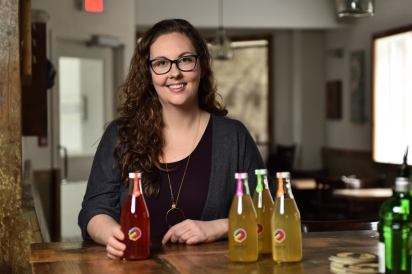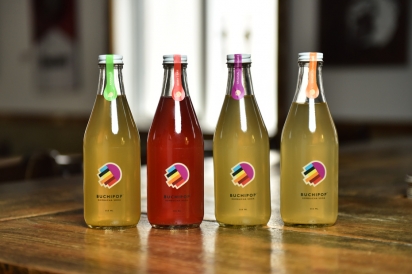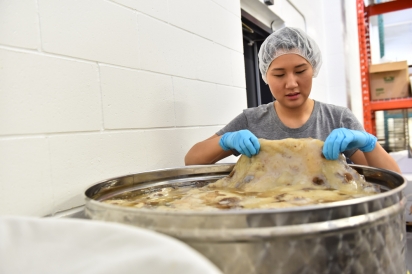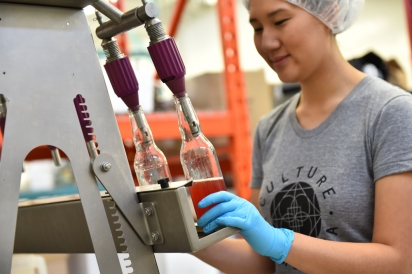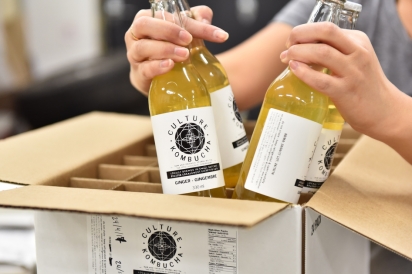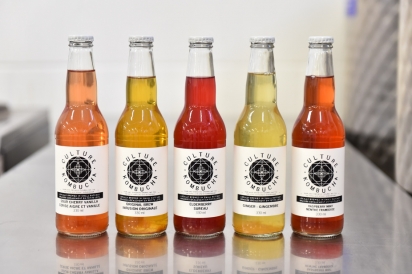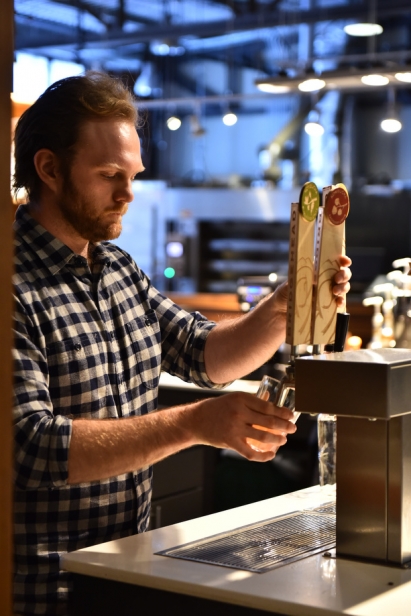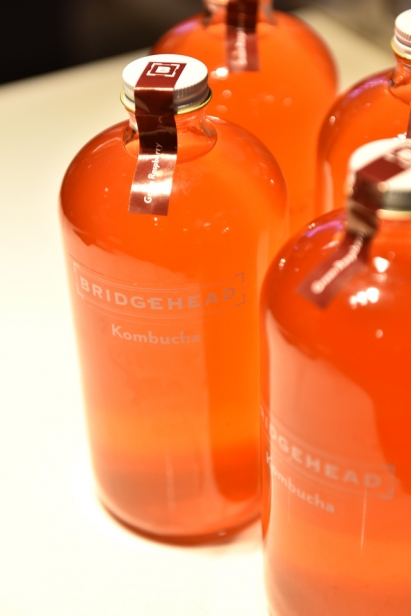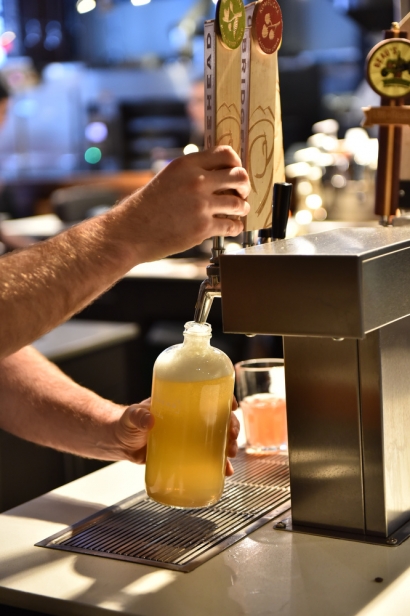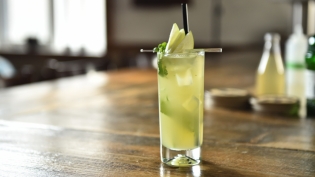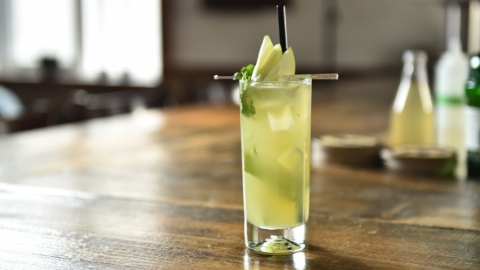Kombucha Culture
Kombucha brewer Trish Larkin would like to introduce you to Hector — or at least, Hector’s good side. Hector the jellyfish adorns each of Larkin’s bottles of Buchipop, the name she’s given the sweet fermented tea she brews in 500-litre batches out of a bare-bones warehouse in Ottawa’s Little Italy neighbourhood.
On those bottles, Hector is cute and playful — a rainbow-coloured critter that fits in with Larkin’s vision of Buchipop as a fun lifestyle brand. But in reality, he’s not even a jellyfish: he’s a scoby, a bizarrelooking amalgamation of yeast and bacteria that — despite its somewhat horrifying aesthetics — gives kombucha its effervescent mouthfeel and its tart-yet-sweet taste.
“We don’t want the soda drinkers of the world to look at our scoby and know that that’s where kombucha is coming from. Because it will turn a lot of people off,” says Larkin, standing next to a covered metal brewing pot, within which one of Hector’s many offspring lurks.
“All the people who drink kombucha know exactly what it looks like and exactly where it’s coming from. But you’ll never see a photo of our scoby on our Instagram. Ever. We made it a rule from the get-go.”
As kombucha grows in popularity in and around Ottawa — there are about a half-dozen commercial brewers in the city — the question of how to take a beverage with such strange origins and make it palatable to a wider pop-loving audience is a pressing one.
“People look at it and they’re like, ‘that’s what I’m taking home? That thing is creepy,'” says Amy Longard, an Ottawa nutritionist who also teaches classes on how people can brew small-scale batches of kombucha at home.
The scoby — actually an acronym, standing for symbiotic culture of yeast and bacteria — is the mushroom-like organism that powers the whole fermentation process. Without its voracious appetite for sugar, the other key ingredient in kombucha, you’d just have sweet tea.
“I told them what the scoby was in layman’s terms — you know, it’s a weird, alien-looking thing,” says Culture Kombucha owner Wentsi Yeung, who also works with kids at the Parkdale Food Centre, getting them to grow herbs for her brews and teaching them the basics of running a small business.
“I haven’t actually shown them my entire big one. But I’ve shown them the one in the bottles. I say, it’s naturally occurring,” says Yeung, the daughter of small-business owners. “And like most people — not just kids — they think it’s disgusting. They’re like, ‘Oh, gross!’ But I’m like, 'it’s okay, you can just pick it out.'”
While the scoby does the hard work, often growing to fit the size of the brew pot, kombucha brewers regularly experiment with all sorts of different ingredients, too. Since opening two years ago, Yeung has incorporated mint, thyme and other aromatics into her brews, as well as elderberries and sour cherries sourced locally from two different farms in eastern Ontario. At Buchipop, Larkin offers up styles brewed with wild berries, fresh ginger, even Amarillo- variety hops, which you’re much more likely to find in a pint of pale ale.
Hop-infused kombucha is also on the way at Ottawa coffee shop chain Bridgehead, where they’ve offered kombuchas based on jasmine, green and oolong teas for the past couple of years. Now, says head beverage strategist and recipe designer Cliff Hansen,they want to create a kombucha that more resembles an “evening” beverage than a tipple for the health conscious.
“Very rarely do you make a beer just to highlight a single hop,” said Hansen, a self-described “nerd” for fermenting. “But with kombucha we have a really neutral, kind of slightly tangy, delicious flavour background that we can add those hop aromatics to and really get a better sense of both what those hops taste like, but also make some really delicious kombucha.”
Because fermentation is involved, kombucha is slightly alcoholic, typically somewhere around one per cent alcohol by volume (ABV). It’s not enough to get a buzz — you’d get ill if you tried — and in fact, Canadian Food Inspection Agency guidelines don’t require beverages that fall under 1.1 per cent ABV to point out their mild booziness on their labels. (Hansen says that at Bridgehead, they tell customers that their kombucha is slightly alcoholic, and that they regularly carry out lab tests to make sure their product is under the legal limit.)
That fermentation is also what gives kombucha, according to those who brew it, its multitude of health benefits. Like yogurt or kefir or other fermented products, kombucha is rich in probiotics — and the fact that it’s significantly less sugary than soda, despite having the same fizzy mouthfeel, has kombucha lovers hoping people will make the switch for the sake of their health.
“People want something effervescent, sweet-tasting. But we know pop has zero nutritional value. In fact, it’s the opposite — it’s extremely unhealthy for you,” says Longard, who first tried kombucha while she was at culinary school in New York City a few years ago.
Longard says the perceived health benefits of kombucha — some have even gone so far as to suggest the beverage boasts anti-cancer properties, although peer-reviewed scientific studies have been few — is one of the reasons it’s now growing in popularity here in Ottawa. (Along with Buchipop, Culture Kombucha and Bridgehead, other commercial brewers in eastern Ontario include Agapé Gardens in Smiths Falls, Uncle Dave’s Friggin Booch in Ottawa, Phoebe’s Ferments in Kemptville, Pyramid Ferments in Prince Edward County and Loon Kombucha in Perth).
“We’re just a little bit behind the trend as usual,” says Longard. “But it’s here. And it’s blowing up.”
As for Larkin, she’d been brewing kombucha at home before deciding to leave her chef’s job and open Buchipop in 2015, when she needed a change and sensed that Ottawa was ready to give fermented tea its due.
They sold their first keg to Elgin Street restaurant Datsun that year, began bottling in 2016, and now are available at dozens of local cafés and grocery stores — as well as on the cocktail menu at nearby Preston Street gastropub two six {ate}. Larkin says she has no plans to stop expanding in 2017, but one thing will remain constant for her customers: there will be no tiny Hectors gazing up from the bottom of their bottle.
“They don’t want a jellyfish floating around in their mouth when they’re trying to drink their drink,” she says. “As delicious as that may or may not be.”
Bridgehead Roastery
130 Anderson St., Ottawa, Ont.
bridgehead.ca, 613.233.1221
Buchipop
50 Beech St., Ottawa, Ont.
buchipop.com, 613.366.5032
Culture Kombucha
409 Industrial Ave., Ottawa, Ont.
culturekombucha.ca, 613.618.1138
Kombucha 101
Amy Longard, a registered holistic nutritionist and plantbased chef, frequently hosts workshops on brewing kombucha to sell-out crowds throughout the Ottawa region. That's because the health benefits of kombucha include improved digestion, a reduction in joint pain and increased energy. Full of antioxidants, enzymes, vitamins C and B, it also offers immune support thanks to beneficial bacteria (probiotics) and all of those antioxidants and vitamins. It's a great alternative to other sugarsweetened beverages (such as pop or juice).
Brewing Workshops
Learn how to make the fermented tea and walk away with a pet scoby of your very own.
Monday, March 27
at Dandelion Foods, 451 Ottawa Street, Almonte Register at dandelionfoods.ca
Monday, April 3
at the SAABOON Shop, 595 Gladstone Ave, Ottawa Register at amylongard.com



